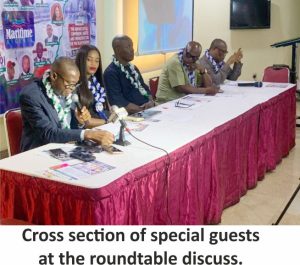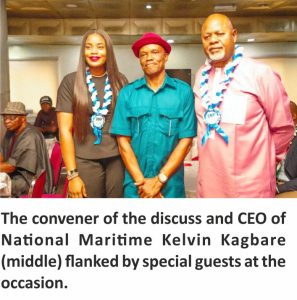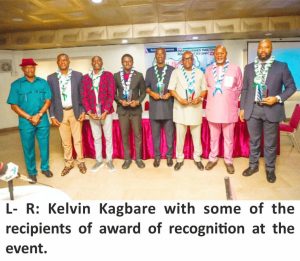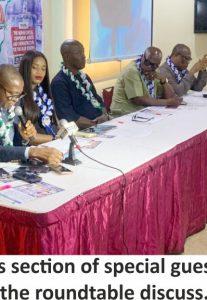RAYMOND TEDUNJAYE, Lagos.
 Experts and opinion moulders in the maritime industry converged in Lagos penultimate Thursday to explore the human capital components, assets and Infrastructure as it relates to the critical development of the Blue The Economy.
Experts and opinion moulders in the maritime industry converged in Lagos penultimate Thursday to explore the human capital components, assets and Infrastructure as it relates to the critical development of the Blue The Economy.
The roundtable discuss, tagged National Discourse 2024 with Distinguished Maritime Personalities (DMPs), themed ” The Human Capital Component, Asset And Infrastructure For The Blue Economy” was organised by Kelvin Kagbare, CEO Maritime Nigeria.
Held at the prestigious Rockview Hotel, Apapa, the discuss attracted renowned stakeholders and egg heads in the maritime industry who judiciously dealt appropriately with the subject matter.
In attendance were Engr. Greg Ogbeifun, Managing Director/ CEO, Starzs Marine & Engineering Limited, Hon Tony Iju Nwabunike, immediate past President, Association of Nigerian Licensed Customs Agents (ANLCA), Barrister Temisan Omatseye, former Director General, Nigeria Maritime Administration and Safety Agency (NIMASA) and Otunba Sola Adewumu, CEO, Equitorial Energy Company Limited.
Others are Henry A. Konyeaso, Executive Assistant to the Chairman, Integrated Oil and Gas Limited who stood in for the Chairman of the occasion, Captain Emmanuel Iheanacho, former Minister of Interior and Chairman, Integrated Oil and Gas, Iroghama Ogbeifun, MD/CEO, Starzs Investment Company Limited, Director General, NIMASA, Dayo Mobereola; Barrister Emeka Akabuogu (SAN), Capt. Iheanacho Ebubeogu, former GM, Corporate Communications and former GM Operations, Nigeria Ports Authority, who was the guest speaker others.
In his welcome address, Captain Iheancho said the seminar would help in shaping the future of the Country’s Marine and Blue Economy.
 He noted that the Marine and Blue Economy is a precious stone waiting to be harnessed for the economic benefit of the country.
He noted that the Marine and Blue Economy is a precious stone waiting to be harnessed for the economic benefit of the country.
To fully realize the potential, according to him, priority must be placed on human capital and infrastructure development, adding that the seminar was critical step in that direction.
DG NIMASA represented by a senior management level official said that as an Agency under the Ministry of Marine and Blue Economy, they have since keyed into agenda of the Federal Government to ensure that the numerous opportunities in the Blue Economy were fully harnessed so as to depend less in the oil economy.
On human capital development, he said NIMASA had continued sensitization of the stakeholders in and around the coastal communities for deeper insight on the need to preserve the oceans.
We are creating enabling environment to boost investment.
He called the media to be objective in reporting the activities of the maritime sector adding that the country is the only country we have.
Engr Ogbeifun in a goodwill message called for the need to do things diligently and always get it right.
The maritime guru said he was excited on the theme, the human capital component.
According to him, human component is a major problem, adding that, “today, we are agitating for or engaging governments, coming together to reestablish a global shipping line for the country. The important thing is not the ship, but the seafarers”
He said that the seafarers are of the aging generation. He thanked the organisers for being consistent.
The President of Nigeria Ship Owners Association (NISA), Otunba Adewumi in a goodwill message said there was no doubt that the major concern is that people talk without action.
He said his association was always acquainting itself with whatever that is going on or with what is happening in the industry. He called for a very good foundation for this new Ministry.
Captain Ebubeogu harped on the need of getting the human element correct, saying if that is not done, “every other thing we are doing is will not go right because every other thing surrounding factors of production is inanimate, its only human beings that will put them together.”
He said that certain chief executive cannot leave their nobs for training, adding that the only answer is to invest on journals and acquire skills. He said that nobody is above training and capacity development.
 In her remarks, Iroghama Ogbeifun, call for the need of the government and private sectors to play their roles rightly for the benefit of all. She said that government’s duty is to formulate policies, drive policies and create enabling environment for the private sector to thrive.
In her remarks, Iroghama Ogbeifun, call for the need of the government and private sectors to play their roles rightly for the benefit of all. She said that government’s duty is to formulate policies, drive policies and create enabling environment for the private sector to thrive.
“Today we are talking about human capacity development. We cannot have industries without people. How quality people are will depend whether the industry will survive.”
There is need for continuous training and there should be space to accommodate the trained workforce.
The Starzs Investments Company Limited MD/CEO asserted that in recruiting human beings, there was need for training and development.
She said that for the Blue Economy to thrive, there must be infrastructure in place.
Hon Nwabunike, in his contribution noted that the maritime sector of the economy has the potential to sustain Nigeria’s growth.
The immediate past President, Association of Nigeria Licensed Customs Agents (ANLCA), said this while presenting a paper titled ‘Automation of Port Processes As An Essential Factor For a Sustainable Blue Economy.”
Nwabunike who was represented by Roland Ekama, noted that the automation of port processes and procedures in Nigeria predated the creation of the Federal Ministry of Marine and Blue Economy, which he said was a brainchild of the President Bola Tinubu administration, added that over 30,000 direct jobs remained untapped in the Marine and Blue Economy sector.
He reminded the audience that the blue economy is about harnessing the benefits of the marine sector without compromising the environment—not about frittering away our gains through bogus and nebulous contracts.
The maritime guru pointed out that his findings showed that over 30,000 direct jobs remain untapped in the marine and blue economy sector, covering fishing, underwater mining, tourism, agriculture, water transportation, hydropower, and other sub-sectors.
Nwabunike noted that political will, technology, and commitment were needed to unlock these opportunities.
He also noted that the role of technology in harnessing the abundant benefits in our industry cannot be overstated, adding that this is where automation becomes critical.
“Although not much has been heard about the National Single Window (NSW) project initiated by the Bola Tinubu administration, it is intended to serve as a clearinghouse for all government business processes related to automation, revenue, security, and trade accountability.
“This presentation would be incomplete without reflecting on Nigeria’s journey toward modernization. As a customs broker and only freight forwarder member of the then Presidential Taskforce on ASYCUDA,
I recall that the Nigeria Customs Service began with the Automated System for Customs Data (ASYCUDA) in the early 1990s under the auspices of the United Nations Conference on Trade and Development (UNCTAD).
“The system later evolved with the introduction of the Nigeria Integrated Customs Information System (NICIS), which was subsequently upgraded to NICIS II. Through NICIS II, the Nigeria Customs Service achieved multi-trillion-naira revenue collection and emerged as one of the most modernized customs administrations in West and Central Africa,” he said
Nwabunike, who was also the pioneer Chairman, Council for the Regulation of Freight Forwarding in Nigeria (CRFFN) said he recently came across information about the “B’Odogwu” modernization program, which aimed to replace NICIS II with a $3 billion, 20-year modernization phase.
He asserted that with the existing systems in place, “I question the need to plunge a resource-limited country into further debt under the guise of modernization.
“If we convert the $3 billion modernization cost over 20 years into naira at the current volatile exchange rate, the implications become even more worrisome.
“I raised my concerns during the tenure of Col Hameed Ali Rtd, as Comptroller-General of Customs, and my position remains unchanged: this proposal is unnecessarily extravagant.
“I assert, without hesitation, that we are on the brink of undertaking the most expensive customs modernization project in the world.
“With all due respect to differing opinions, I challenge anyone in the maritime industry to provide an example of any other country that has spent $3 billion on modernizing a single government agency—especially one that has been evolving since the 1990s.”
Let us look back ten years. While the Nigeria Customs Service has made strides in revenue collection, the impact is debatable. In 2014, NCS collected N977.09 billion against a target of N1.2 trillion. That figure appears larger today due to inflation, with N3.21 trillion collected in 2023.
However, the naira-dollar exchange rate in 2014 averaged N168 to $1, while in 2024, it averages around N1,670 to $1. When adjusted for inflation, the N977 billion collected in 2014 would be equivalent to N8.35 trillion today. Thus, the so-called revenue growth is an illusion, masking the erosion of real value.
The B’Odogwu project, in my view, is unnecessary and will result in the waste of scarce resources. Even if the Nigeria Customs Service excels at revenue collection, the proposed modernization is unjustifiable as it risks squandering government earnings on unproven initiatives.
We must ask: What value does the B’Odogwu project offer that could not be achieved by upgrading NICIS II? Moreover, has any developing or developed nation earmarked such massive funds to modernize a single government agency?
“Nigeria still has significant work to do in streamlining its port operations to attract more business. Many Nigerian importers and shippers prefer using ports in Ghana, Togo, and Benin Republic due to faster, more efficient processes.
“It is important for Nigeria to conduct a peer review of these neighboring countries to understand why, for example, Benin Republic operates an automated port system with almost no complaints, while Nigeria continues to struggle with delays, extortion, multiple agency checks, unnecessary alerts, and other bottlenecks.”
He thus, called for expert-driven port system, saying the federal government should allow the port system to be driven by experts, adding that a sustainable blue economy requires robust public-private sector collaboration.
The convener, Mr. Kelvin Kagbare, in a welcome address said that the theme “The Human Capital Component, Assets and Infrastructure for the Blue Economy,” was chosen after deliberate consideration of what the Ministry of Marine and Blue Economy, with His Excellency, Adegboyega Oyetola as Minister has done so far.
“In the area of human Capital Development, Maritime Nigeria thinks we are still where we were prior to the creation of the Ministry by President Bola Ahmed Tinubu in May 2023. We were told that the Blue Economy has the capacity to generate over $1.5 trillion per year, provide over 30 million jobs and serve as a vital source of protein.


